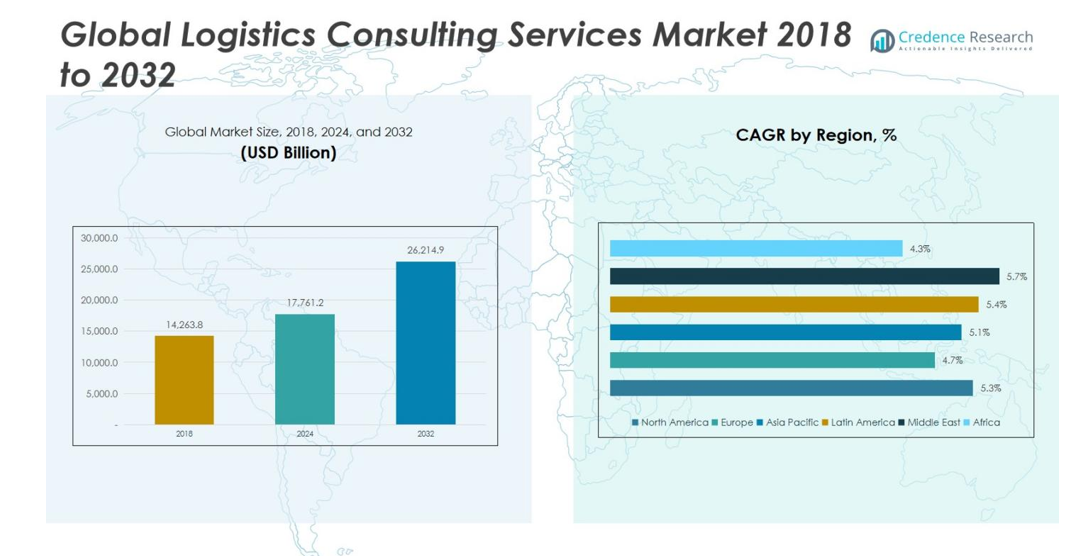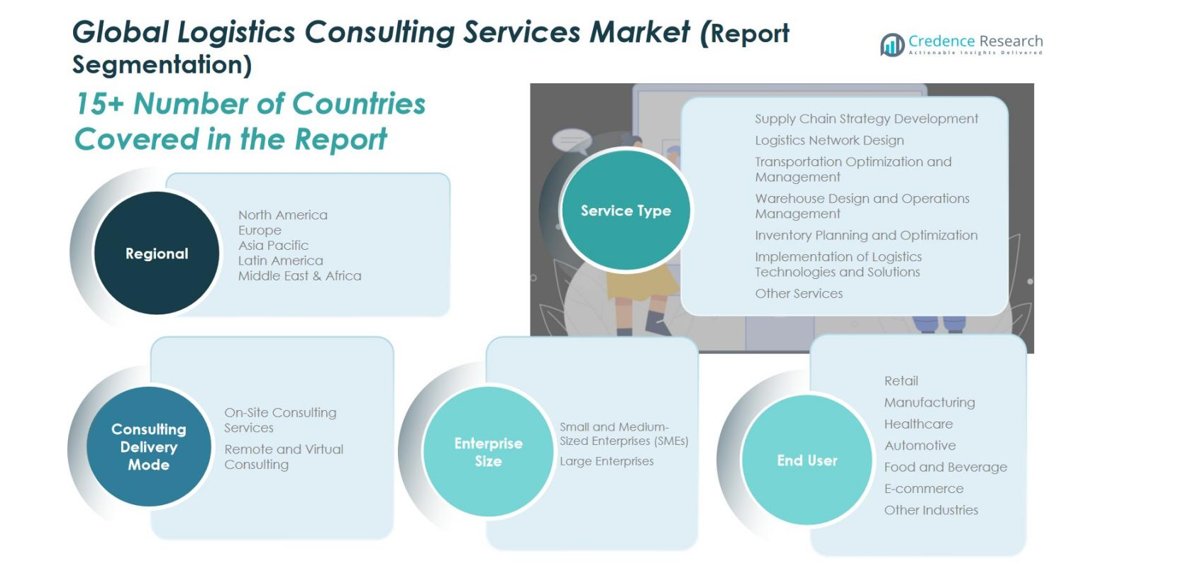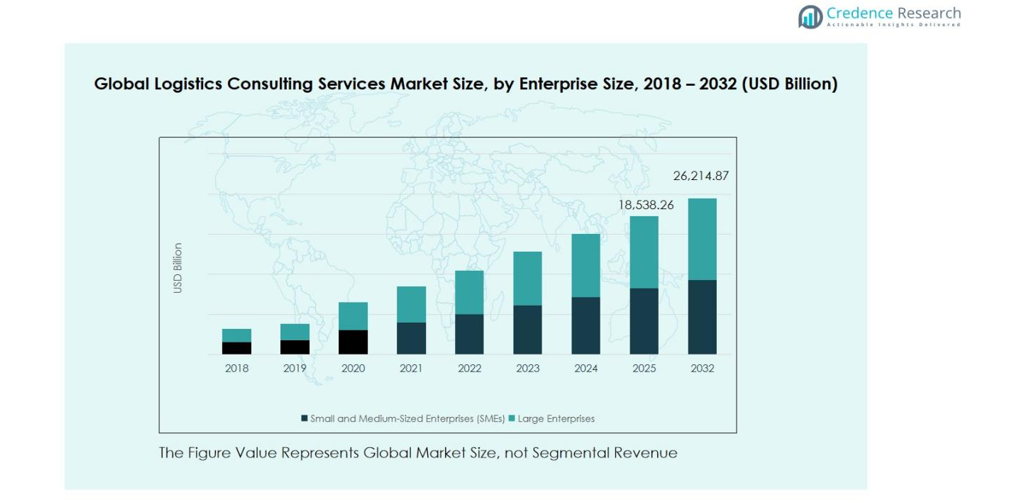CHAPTER NO. 1 : GENESIS OF THE MARKET
1.1 Market Prelude – Introduction & Scope
1.2 The Big Picture – Objectives & Vision
1.3 Strategic Edge – Unique Value Proposition
1.4 Stakeholder Compass – Key Beneficiaries
CHAPTER NO. 2 : EXECUTIVE LENS
2.1 Pulse of the Industry – Market Snapshot
2.2 Growth Arc – Revenue Projections (USD Million)
2.3. Premium Insights – Based on Primary Interviews
CHAPTER NO. 3 : LOGISTICS CONSULTING SERVICES MARKET FORCES & INDUSTRY PULSE
3.1 Foundations of Change – Market Overview
3.2 Catalysts of Expansion – Key Market Drivers
3.2.1 Momentum Boosters – Growth Triggers
3.2.2 Innovation Fuel – Disruptive Technologies
3.3 Headwinds & Crosswinds – Market Restraints
3.3.1 Regulatory Tides – Compliance Challenges
3.3.2 Economic Frictions – Inflationary Pressures
3.4 Untapped Horizons – Growth Potential & Opportunities
3.5 Strategic Navigation – Industry Frameworks
3.5.1 Market Equilibrium – Porter’s Five Forces
3.5.2 Ecosystem Dynamics – Value Chain Analysis
3.5.3 Macro Forces – PESTEL Breakdown
CHAPTER NO. 4 : KEY INVESTMENT EPICENTER
4.1 Regional Goldmines – High-Growth Geographies
4.2 Product Frontiers – Lucrative Type Categories
4.3 Consulting Delivery Mode Sweet Spots – Emerging Demand Segments
CHAPTER NO. 5: REVENUE TRAJECTORY & WEALTH MAPPING
5.1 Momentum Metrics – Forecast & Growth Curves
5.2 Regional Revenue Footprint – Market Share Insights
5.3 Segmental Wealth Flow – Service Type, Consulting Delivery Mode, Enterprise Size, & End User Revenue
CHAPTER NO. 6 : TRADE & COMMERCE ANALYSIS
6.1. Import Analysis By Region
6.1.1. Global Logistics Consulting Services Market Import Revenue By Region
6.2. Export Analysis By Region
6.2.1. Global Logistics Consulting Services Market Export Revenue By Region
CHAPTER NO. 7 : COMPETITION ANALYSIS
7.1. Company Market Share Analysis
7.1.1. Global Logistics Consulting Services Market: Company Market Share
7.2. Global Logistics Consulting Services Market Company Revenue Market Share
7.3. Strategic Developments
7.3.1. Acquisitions & Mergers
7.3.2. New Product Launch
7.3.3. Regional Expansion
7.4. Competitive Dashboard
7.5. Company Assessment Metrics, 2024
CHAPTER NO. 8 : LOGISTICS CONSULTING SERVICES MARKET – BY SERVICES TYPE SEGMENT ANALYSIS
8.1. Logistics Consulting Services Market Overview By Services Type Segment
8.1.1. Logistics Consulting Services Market Revenue Share By Services Type
8.2. Supply Chain Strategy Development
8.3. Logistics Network Design
8.4. Transportation Optimization and Management
8.5. Warehouse Design and Operations Management
8.6. Inventory Planning and Optimization
8.7. Implementation of Logistics Technologies and Solutions
8.8. Other Services
CHAPTER NO. 9 : LOGISTICS CONSULTING SERVICES MARKET – BY CONSULTING DELIVERY MODE SEGMENT ANALYSIS
9.1. Logistics Consulting Services Market Overview By Consulting Delivery Mode Segment
9.1.1. Logistics Consulting Services Market Revenue Share By Consulting Delivery Mode
9.2. On-Site Consulting Services
9.3. Remote and Virtual Consulting
CHAPTER NO. 10 : LOGISTICS CONSULTING SERVICES MARKET – BY ENTERPRISE SIZE SEGMENT ANALYSIS
10.1. Logistics Consulting Services Market Overview By Enterprise Size Segment
10.1.1. Logistics Consulting Services Market Revenue Share By Enterprise Size
10.2. Small and Medium-Sized Enterprises (SMEs)
10.3. Large Enterprises
CHAPTER NO. 11 : LOGISTICS CONSULTING SERVICES MARKET – BY END USER SEGMENT ANALYSIS
11.1. Logistics Consulting Services Market Overview By End User Segment
11.1.1. Logistics Consulting Services Market Revenue Share By End User
11.2. Retail
11.3. Manufacturing
11.4. Healthcare
11.5. Automotive
11.6. Food and Beverage
11.7. E-commerce
11.8. Other Industries
CHAPTER NO. 12 : LOGISTICS CONSULTING SERVICES MARKET – REGIONAL ANALYSIS
12.1. Logistics Consulting Services Market Overview By Region Segment
12.1.1. Global Logistics Consulting Services Market Revenue Share By Region
12.1.2. Regions
12.1.3. Global Logistics Consulting Services Market Revenue By Region
12.1.4. Type
12.1.5. Global Logistics Consulting Services Market Revenue By Services Type
12.1.6. Consulting Delivery Mode
12.1.7. Global Logistics Consulting Services Market Revenue By Consulting Delivery Mode
12.1.8. Enterprise Size
12.1.9. Global Logistics Consulting Services Market Revenue By Enterprise Size
12.1.10. End User
12.1.11. Global Logistics Consulting Services Market Revenue By End User
CHAPTER NO. 13 : NORTH AMERICA LOGISTICS CONSULTING SERVICES MARKET – COUNTRY ANALYSIS
13.1. North America Logistics Consulting Services Market Overview By Country Segment
13.1.1. North America Logistics Consulting Services Market Revenue Share By Region
13.2. North America
13.2.1. North America Logistics Consulting Services Market Revenue By Country
13.2.2. Type
13.2.3. North America Logistics Consulting Services Market Revenue By Services Type
13.2.4. Consulting Delivery Mode
13.2.5. North America Logistics Consulting Services Market Revenue By Consulting Delivery Mode
13.2.6. Enterprise Size
13.2.7. North America Logistics Consulting Services Market Revenue By Enterprise Size
13.2.8. End User
13.2.9. North America Logistics Consulting Services Market Revenue By End User
13.3. U.S.
13.4. Canada
13.5. Mexico
CHAPTER NO. 14 : EUROPE LOGISTICS CONSULTING SERVICES MARKET – COUNTRY ANALYSIS
14.1. Europe Logistics Consulting Services Market Overview By Country Segment
14.1.1. Europe Logistics Consulting Services Market Revenue Share By Region
14.2. Europe
14.2.1. Europe Logistics Consulting Services Market Revenue By Country
14.2.2. Type
14.2.3. Europe Logistics Consulting Services Market Revenue By Services Type
14.2.4. Consulting Delivery Mode
14.2.5. Europe Logistics Consulting Services Market Revenue By Consulting Delivery Mode
14.2.6. Enterprise Size
14.2.7. Europe Logistics Consulting Services Market Revenue By Enterprise Size
14.2.8. End User
14.2.9. Europe Logistics Consulting Services Market Revenue By End User
14.3. UK
14.4. France
14.5. Germany
14.6. Italy
14.7. Spain
14.8. Russia
14.9. Rest of Europe
CHAPTER NO. 15 : ASIA PACIFIC LOGISTICS CONSULTING SERVICES MARKET – COUNTRY ANALYSIS
15.1. Asia Pacific Logistics Consulting Services Market Overview By Country Segment
15.1.1. Asia Pacific Logistics Consulting Services Market Revenue Share By Region
15.2. Asia Pacific
15.2.1. Asia Pacific Logistics Consulting Services Market Revenue By Country
15.2.2. Type
15.2.3. Asia Pacific Logistics Consulting Services Market Revenue By Services Type
15.2.4. Consulting Delivery Mode
15.2.5. Asia Pacific Logistics Consulting Services Market Revenue By Consulting Delivery Mode
15.2.6. Enterprise Size
15.2.7. Asia Pacific Logistics Consulting Services Market Revenue By Enterprise Size
15.2.8. End User
15.2.9. Asia Pacific Logistics Consulting Services Market Revenue By End User
15.3. China
15.4. Japan
15.5. South Korea
15.6. India
15.7. Australia
15.8. Southeast Asia
15.9. Rest of Asia Pacific
CHAPTER NO. 16 : LATIN AMERICA LOGISTICS CONSULTING SERVICES MARKET – COUNTRY ANALYSIS
16.1. Latin America Logistics Consulting Services Market Overview By Country Segment
16.1.1. Latin America Logistics Consulting Services Market Revenue Share By Region
16.2. Latin America
16.2.1. Latin America Logistics Consulting Services Market Revenue By Country
16.2.2. Type
16.2.3. Latin America Logistics Consulting Services Market Revenue By Services Type
16.2.4. Consulting Delivery Mode
16.2.5. Latin America Logistics Consulting Services Market Revenue By Consulting Delivery Mode
16.2.6. Enterprise Size
16.2.7. Latin America Logistics Consulting Services Market Revenue By Enterprise Size
16.2.8. End User
16.2.9. Latin America Logistics Consulting Services Market Revenue By End User
16.3. Brazil
16.4. Argentina
16.5. Rest of Latin America
CHAPTER NO. 17 : MIDDLE EAST LOGISTICS CONSULTING SERVICES MARKET – COUNTRY ANALYSIS
17.1. Middle East Logistics Consulting Services Market Overview By Country Segment
17.1.1. Middle East Logistics Consulting Services Market Revenue Share By Region
17.2. Middle East
17.2.1. Middle East Logistics Consulting Services Market Revenue By Country
17.2.2. Type
17.2.3. Middle East Logistics Consulting Services Market Revenue By Services Type
17.2.4. Consulting Delivery Mode
17.2.5. Middle East Logistics Consulting Services Market Revenue By Consulting Delivery Mode
17.2.6. Enterprise Size
17.2.7. Middle East Logistics Consulting Services Market Revenue By Enterprise Size
17.2.8. End User
17.2.9. Middle East Logistics Consulting Services Market Revenue By End User
17.3. GCC Countries
17.4. Israel
17.5. Turkey
17.6. Rest of Middle East
CHAPTER NO. 18 : AFRICA LOGISTICS CONSULTING SERVICES MARKET – COUNTRY ANALYSIS
18.1. Africa Logistics Consulting Services Market Overview By Country Segment
18.1.1. Africa Logistics Consulting Services Market Revenue Share By Region
18.2. Africa
18.2.1. Africa Logistics Consulting Services Market Revenue By Country
18.2.2. Type
18.2.3. Africa Logistics Consulting Services Market Revenue By Services Type
18.2.4. Consulting Delivery Mode
18.2.5. Africa Logistics Consulting Services Market Revenue By Consulting Delivery Mode
18.2.6. Enterprise Size
18.2.7. Africa Logistics Consulting Services Market Revenue By Enterprise Size
18.2.8. End User
18.2.9. Africa Logistics Consulting Services Market Revenue By End User
18.3. South Africa
18.4. Egypt
18.5. Rest of Africa
CHAPTER NO. 19 : COMPANY PROFILES
19.1. Bain & Company
19.1.1. Company Overview
19.1.2. Service Portfolio
19.1.3. Financial Overview
19.1.4. Recent Developments
19.1.5. Growth Strategy
19.1.6. SWOT Analysis
19.2. YCP Group
19.3. Clarkston Co
19.4. Comcast Corp.
19.5. KPMG International
19.6. Logistics Bureau
19.7. The Supply Chain Consulting Group
19.8. Cybage
19.9. Advatix
19.10. Other Key Players






